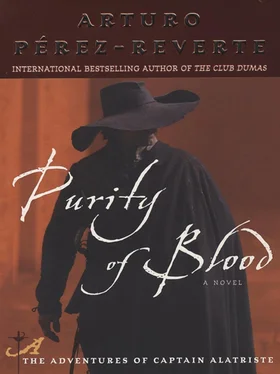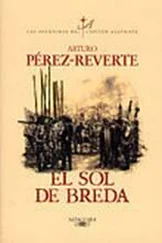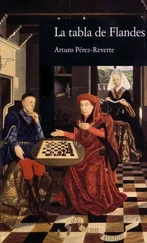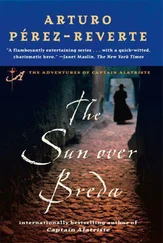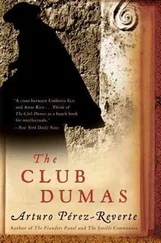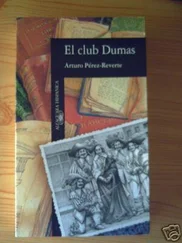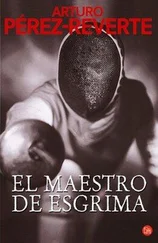Arturo Pérez-Reverte - Purity of Blood
Здесь есть возможность читать онлайн «Arturo Pérez-Reverte - Purity of Blood» весь текст электронной книги совершенно бесплатно (целиком полную версию без сокращений). В некоторых случаях можно слушать аудио, скачать через торрент в формате fb2 и присутствует краткое содержание. Жанр: Старинная литература, на английском языке. Описание произведения, (предисловие) а так же отзывы посетителей доступны на портале библиотеки ЛибКат.
- Название:Purity of Blood
- Автор:
- Жанр:
- Год:неизвестен
- ISBN:нет данных
- Рейтинг книги:3 / 5. Голосов: 1
-
Избранное:Добавить в избранное
- Отзывы:
-
Ваша оценка:
- 60
- 1
- 2
- 3
- 4
- 5
Purity of Blood: краткое содержание, описание и аннотация
Предлагаем к чтению аннотацию, описание, краткое содержание или предисловие (зависит от того, что написал сам автор книги «Purity of Blood»). Если вы не нашли необходимую информацию о книге — напишите в комментариях, мы постараемся отыскать её.
Purity of Blood — читать онлайн бесплатно полную книгу (весь текст) целиком
Ниже представлен текст книги, разбитый по страницам. Система сохранения места последней прочитанной страницы, позволяет с удобством читать онлайн бесплатно книгу «Purity of Blood», без необходимости каждый раз заново искать на чём Вы остановились. Поставьте закладку, и сможете в любой момент перейти на страницу, на которой закончили чтение.
Интервал:
Закладка:
But thanks to God, their exchange had been in quiet voices, without making a public stir or doing irreparable damage to the old, tough, and contentious friendship between the two veterans. At any rate, Calle Mayor after a fiesta de toros, with all Madrid packed into the streets, was no place for hot words, or steel, or anything else. So in the end, Saldaña let the air out of his lungs with a hoarse sigh. All of a sudden he seemed relaxed, and in his dark eyes, still directed at Captain Alatriste, I thought I glimpsed the spark of a smile.
“One day, Diego, you are going to end up murdered.”
“Perhaps. If so, no one better to do it than you.”
Now it was Alatriste who was smiling beneath his thick soldier’s mustache. I saw Saldaña wag his head with comic distress.
“We would do well,” he said, “to change the subject.”
He had reached out with a quick, almost clumsy, gesture—at once rough and friendly—and jabbed the captain’s shoulder.
“Come, then. Buy me a drink.”
And that was that. A few steps farther on, we stopped at the Herradores tavern, which was filled, as always, with lackeys, squires, porters, and old women willing to be hired out as duennas, mothers, or aunts. A serving girl set two jugs of Valdemoro on the wine-stained table, which Alatriste and the head constable tossed down in a nonce, for their verbal sparring had quickened their thirst. I, not yet fourteen, had to settle for a glass of water from the large jug, since the captain never allowed me a taste of wine except what we dipped our bread into at breakfast—there was not always money for chocolate—or, when I was not well, to restore my color. Although Caridad la Lebrijana, on the sly, would sometimes give me slices of bread sprinkled with wine and sugar, a treat to which I, a boy without two coins to rub together to buy sweets, was greatly addicted.
In regard to wine, the captain told me that I would have plenty of time in my life to drink till I burst, if I wished; that it was never too late for a man to do that, adding that he had known too many good men who ended up lost in the fumes of Bacchus’s grapes.
He told me these things little by little, for as I’ve said, Alatriste was a man of few words, and his silences often said more than when he spoke aloud. The fact is that later, when I, too, was a soldier—among many other things—I sometimes did tip my jug too much. But I was always civil when I was tippling, and in me it never became a vice—I had others that were worse—but only an occasional stimulus and diversion. And I believe that I owe my moderation to Captain Alatriste, although he never preached that homily by example. On the contrary, I well remember his long, silent drinking bouts. Unlike other men, he did not often have his wine in company, nor did his bottles make him jolly. His way of drinking was calm, deliberate, and melancholy. And when the wine began to take effect, he would close up like a clam and avoid his friends.
In truth, every time I remember him drunk, it was alone in our lodgings on Calle del Arcabuz, on the courtyard that opened to the back of the Tavern of the Turk. He would sit motionless before his glass, jug, or bottle, his eyes fixed on the wall where he hung his sword, dagger, and hat, as if contemplating images that only he and his obstinate silence could evoke. And by the way his mouth tightened beneath his veteran’s mustache, I would take an oath that the images were not those a man contemplates, or relives, gladly. If it is true that each of us carries his specters within him, those of Diego Alatriste y Tenorio were not servile or friendly or good company. But, as I heard him say once, shrugging his shoulders in the way that was so typical of him—half resignation and half indifference—an honorable man can choose the way and the place he dies, but no one can choose the things he remembers.
Activity at the mentidero of San Felipe was at its peak. The steps and terrace of the church facing Calle Mayor were an anthill: people chattering in groups, strolling around greeting acquaintances, elbowing their way to a place at the railing from which they could watch the coaches and crowds filling the street below in the stylized promenade they called the rúa. That was where Martín Saldaña bid us farewell. We were not, however, alone for long, for shortly thereafter we ran into El Tuerto Fadrique, the one-eyed apothecary at Puerta Cerrada, and Dómine Pérez; they, too had just come from the spectacle of the bulls, and were still praising them. In fact, it had been the dómine who had administered the sacraments to the German guard whose traveling papers had just been signed by the Jarama bull. The Jesuit was recounting all the details, telling how the queen, being young, and French, had turned pale and nearly swooned in the royal box, and how our lord and king had gallantly taken her hand to comfort her. However, instead of retiring, as many expected she would do, she had stayed on at the Casa de la Panadería. Her gesture was so appreciated by the public that when she and the king rose, signaling the end of the spectacle, they were favored with a warm ovation, to which Philip the Fourth, young and refined as he was, responded by doffing his hat.
I have already told Your Mercies, on a different occasion, that in the first third of the century, the people of Madrid, despite their natural fondness for mischief and malice, still harbored a certain naiveté in regard to such royal gestures. It was an ingenuousness that time and disasters would replace with disillusion, rancor, and shame. But at the time of this tale, our monarch was still a young man, and Spain, although already corrupt, and with mortal ulcers eating her heart, maintained her appearance, all her dazzle and politesse. We were still a force to be reckoned with, and would continue to be for some time, until we bled the last soldier and the last maravedí dry. Holland despised us; England feared us; the Turk was ever hovering ’round; the France of Richelieu was gritting its teeth; the Holy Father received our grave, black-clad ambassadors with caution; and all Europe trembled at the sight of our tercios —still the best infantry in the world—as if the rat-a-tat-tat of the drums came from the Devil’s own drumsticks. And I, who lived through those years, and those that came later, I swear to Your Mercies that in that century we were still what no country had ever been before.
And when the sun that had shed its light on Tenochtitlán, Pavia, San Quintín, Lepanto, and Breda finally set, the horizon glowed red with our blood—but also that of our enemies. As it had that day in Rocroi when I left the dagger Captain Alatriste had given me in the body of a Frenchman. Your Mercies will agree that we Spanish should have devoted all that effort and courage to building a decent nation, instead of squandering it on absurd wars, roguery, corruption, chimeras, and holy water. And that is very true. But I am reporting how it was. And furthermore, not all peoples are equally rational in choosing their opportunities or their destinies, nor equally cynical in later justifying to History or to themselves what they have done. As for us, we were men of our century. We did not choose to be born and to live in that often miserable but sometimes magnificent Spain, it was our fate. But it was our Spain. And that is the unhappy patria —or whatever word they use nowadays—that like it or not I carry under my skin, in my weary eyes, and in my memory.
It is in that memory that I see, as if it were yesterday, don Francisco de Quevedo at the foot of the San Felipe steps. He was, as always, wearing strict black, except for the starched white collar and red cross of Santiago on the left side of his doublet. And although the afternoon was sunny, he had flung over his shoulders the long cape he wore to disguise his lameness, a dark cloak whose tail was lifted by the sheath of the sword upon which his hand rested so casually. He was talking with some acquaintances, hat in hand, when a lady’s greyhound roaming nearby nosed close enough to brush his gloved right hand. The lady was standing by the footboard of her coach, conversing with two caballeros—and she was pretty. As the hound meandered by, don Francisco patted its head, at the same time sending a quick and courtly glance toward its mistress. The greyhound trotted back to her as if it were a messenger of the caress, and the lady rewarded the poet’s tribute with a smile and a flutter of her fan, both received by don Francisco with a slight nod as he twisted his luxuriant mustache between thumb and forefinger.
Читать дальшеИнтервал:
Закладка:
Похожие книги на «Purity of Blood»
Представляем Вашему вниманию похожие книги на «Purity of Blood» списком для выбора. Мы отобрали схожую по названию и смыслу литературу в надежде предоставить читателям больше вариантов отыскать новые, интересные, ещё непрочитанные произведения.
Обсуждение, отзывы о книге «Purity of Blood» и просто собственные мнения читателей. Оставьте ваши комментарии, напишите, что Вы думаете о произведении, его смысле или главных героях. Укажите что конкретно понравилось, а что нет, и почему Вы так считаете.
